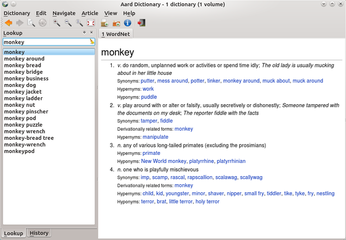Aard Dictionary: Reference Tool for Linux Desktop and Android

Productivity Sauce
Need a dictionary tool that works equally well on a Linux desktop and Android devices? Consider Aard dictionary. This is a rather competent dictionary tool that can handle humongous references like an offline version of Wikipedia with aplomb. Aadict can also manage multiple references and dictionaries, so you can look up a word in multiple sources at once. The application uses its own aar format, and the project's website offers tools for compiling dictionaries. But before you get your hands dirty building your own .aar files, you might want to check the selection of ready-made dictionaries, which include the ever-popular WordNet dictionary, an assortment of Wikipedia files, Wiktionary dictionaries, and much more.
Aard Dictionary binaries are available for Ubuntu and other platforms. Alternatively, you can install Aard Dictionary from source. To do this on Ubuntu, install the python-pyicu package, grab the latest source code release from the project's website, and unpack the downloaded archive. Switch to the resulting directory in the terminal and execute the sudo python setup.py install command. You can also launch Aard Dictionary without installing it using the run.py script. Once the application is up and running, press the Add dictionaries button to add individual dictionary files, or use the Add dictionary directory button to point Aard Dictionary to a directory containing dictionary files. Type then the desired word in the Lookup field to view the results from the added dictionary files.
The Android version of Aard Dictionary is available on Google Play. During the first run, the app automatically scans the default locations and adds the found dictionary files. The app's interface is bare-bones, but it gets the job done.
comments powered by DisqusSubscribe to our Linux Newsletters
Find Linux and Open Source Jobs
Subscribe to our ADMIN Newsletters
Support Our Work
Linux Magazine content is made possible with support from readers like you. Please consider contributing when you’ve found an article to be beneficial.

News
-
Linux Mint 22.3 Now Available with New Tools
Linux Mint 22.3 has been released with a pair of new tools for system admins and some pretty cool new features.
-
New Linux Malware Targets Cloud-Based Linux Installations
VoidLink, a new Linux malware, should be of real concern because of its stealth and customization.
-
Say Goodbye to Middle-Mouse Paste
Both Gnome and Firefox have proposed getting rid of a long-time favorite Linux feature.
-
Manjaro 26.0 Primary Desktop Environments Default to Wayland
If you want to stick with X.Org, you'll be limited to the desktop environments you can choose.
-
Mozilla Plans to AI-ify Firefox
With a new CEO in control, Mozilla is doubling down on a strategy of trust, all the while leaning into AI.
-
Gnome Says No to AI-Generated Extensions
If you're a developer wanting to create a new Gnome extension, you'd best set aside that AI code generator, because the extension team will have none of that.
-
Parrot OS Switches to KDE Plasma Desktop
Yet another distro is making the move to the KDE Plasma desktop.
-
TUXEDO Announces Gemini 17
TUXEDO Computers has released the fourth generation of its Gemini laptop with plenty of updates.
-
Two New Distros Adopt Enlightenment
MX Moksha and AV Linux 25 join ranks with Bodhi Linux and embrace the Enlightenment desktop.
-
Solus Linux 4.8 Removes Python 2
Solus Linux 4.8 has been released with the latest Linux kernel, updated desktops, and a key removal.

